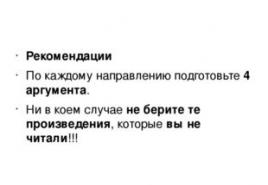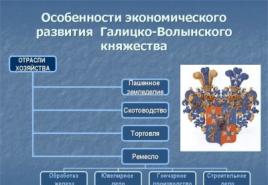The meaning of the word deimos. The meaning of the word "deimos" The ancient world
Horror Dictionary of Russian synonyms. deimos n., number of synonyms: 2 satellite (174) horror ... Synonym dictionary
- (from the Greek deimos horror) satellite of Mars, discovered by A. Hall (USA, 1877). The distance from Mars is 23,460 km. It has an irregular shape, the largest diameter is approx. 16 km. Sidereal orbital period 1 day 6 h 17 min … Big Encyclopedic Dictionary
- (Deim) demon of horror, son of Ares. Corresponds to the Roman Pavor. (Source: "Myths of Ancient Greece. Dictionary Reference." EdwART, 2009.) ... Encyclopedia of mythology
- (from the Greek. déimos horror), a satellite of Mars, discovered by A. Hall (USA, 1877). The distance from Mars is 23460 km. It has an irregular shape, the largest diameter is about 16 km. Sidereal circulation period 1 day 6 h 17 min. * * * DEIMOS DEIMOS (Latin ... ... encyclopedic Dictionary
Satellite of the planet Mars, diameter 6 km, distance from the center of the planet 23.5 thousand km. Discovered in 1877 by the American astronomer E. Hall. See also Satellites of planets ... Great Soviet Encyclopedia
One of the two moons of Mars (more distant); discovered by Asaph Gaulle in Washington in 1877. Orbits around Mars at 1.2625 days or 30 hours. 18 min., with an average distance from the center of the planet of 20,000 ver. Diameter D. about 27 ver. For the people of the earth... Encyclopedic Dictionary F.A. Brockhaus and I.A. Efron
- (from the Greek deimos horror), a satellite of Mars, discovered by A. Hall (USA, 1877). The distance from Mars is 23460 km. It has an irregular shape, the largest diameter is approx. 16 km. Siderich. orbital period 1 day 6 h 17 min … Natural science. encyclopedic Dictionary
- (from the Greek deimos horror), a satellite of Mars, discovered by A. Hall (USA, 1877). The distance from Mars is 23,460 km. It has an irregular shape, the largest diameter is approx. 16 km. Sidereal orbital period 1 day 6 h 17 min … Astronomical dictionary
Deimos- see Arey. (I.A. Lisovy, K.A. Revyako. The ancient world in terms, names and titles: Dictionary reference book on the history and culture of Ancient Greece and Rome / Scientific ed. A.I. Nemirovsky. 3rd ed. Mn: Belarus , 2001) ... Antique world. Dictionary reference.
deimos- a, h. Satellite of the planet Mars ... Ukrainian glossy dictionary
Books
- The Adventures of Richard Blade Continued, J. Lord. This book is the fourth volume of the fantastic adventures of Richard Blade in other worlds. In the novel `The Beast of the Labyrinth`, Blade fights with a mysterious and powerful priest, ...
- Richard Blade's Adventures in Other Worlds, Geoffrey Lord. The novels of Geoffrey Lord presented in this book open a three-volume series about the fantastic adventures of Richard Blade - a fearless agent of the British Secret Service, Superman and ...
Who is Deimos? One of the gods of ancient Greece, terrifying mortals. It's in mythology. According to the series "The Amazing Journeys of Hercules", Deimos is a blond type with a nasty laugh.
In this article, we will consider both characters: both mythological and the one about which the series tells.
According to the myths
Deimos is the god of horrors. The bloodthirsty son of the god of war Ares and the beautiful goddess of love Aphrodite. Mythology indicates that Ares and Aphrodite are brother and sister. Accordingly, we are dealing with closely related inbreeding, or in other words, incest. What could be the result? From an illegal union, an unpredictable creature was born - Deimos. And also, according to mythology, he had a twin brother - Phobos, who personified fear.
Deimos had a normal appearance. But the character is such that horror. No wonder the guy was awarded the title of the god of horrors on Olympus.
What was the god of horror Deimos, judging by the myths? The product of the madness of war and the madness of love. Of course, nothing good could happen there. Absolutely unpredictable god. It was impossible to predict what to expect from him in a few minutes.
The bloodthirstiness of Deimos is worthy of a separate topic. He accompanied his father in all battles and was not inferior to him in bloodlust and the ability to wield a sword. Deimos killed for the sake of excitement, his hunting instincts worked very well. He enjoyed it as long as the victim resisted. As soon as she stopped resisting, the god of horror lost interest in her and began to look for a new one.
The main function of the god Deimos was to spread terror and confusion. He took on a great responsibility, generously watering the earth with blood. As mentioned above, he accompanied Ares in battles. Together with him on the battlefield were brother Phobos, responsible for fear, the goddess Eris - the main discord on Olympus and Enio - the goddess of violent war, the eternal companion of Ares.
Deimos from the series
In 1995, a TV series dedicated to the ancient Greek hero Hercules was released. It was called "The Wonderful Journeys of Hercules". And of course, its action took place in ancient Greece, according to the plot, many inhabitants of Olympus were involved.
One of these eternal enemies of Hercules and his companion Iolaus were Ares, Disharmony (Eris) and Deimos. What is he, the ancient Greek god Deimos from the specified series? The complete opposite. A kind of tall, very skinny blond creature, dressed in a ridiculous dark brown leather suit, the bottom of which resembles pantaloons, from which the skinny legs of the god of horrors stick out.

In the series, he is Ares' nephew. Who are the parents of Deimos - is unknown. At first, the version was popular that his mother was Disharmony, corresponding to the mythological Eris. Then it turned out that she was Deimos' cousin and Ares' girlfriend. It's a friend, not a sister.
Serial Deimos behaves funny. He constantly tries to do something nasty to Hercules, but nothing comes of it. Mind is not enough to outwit a demigod. Although it is rather strange that a god cannot defeat a mortal With a deafening crash, the god Deimos regularly fails certain tasks that Ares gives him. Moreover, the latter is not distinguished by patience. He is very cunning, damn smart and dazzlingly good-looking. How Ares from the series, possessing simply stunning qualities of a "bad uncle", endures a parody of the god of horrors next to him - remains a mystery.
And Deimos from the series laughs so that around the birds from the trees fall and beat in death convulsions. With one laugh, he could repeatedly kill Hercules. But the ability is only enough for innocent birds.
In general, it can be characterized as a complex divine misunderstanding. Deimos is amazingly played by actor Joel Tobek.

- In honor of the god of horrors, one of the satellites of the planet Mars is named.
- The satellite Deimos, as well as Phobos, is always turned towards Mars with only one side.
- One day Deimos will fall on Mars, according to scientists, and Phobos will collapse.
- The shape of this satellite resembles a cobblestone.
- Deimos is considered one of the smallest satellites of the planet.
- There is a hypothesis that once there was only one satellite of Mars. Then it split, and Phobos and Deimos turned out.
- According to the myths, Deimos had an expressive appearance.
- Now on the Internet you can find information that Deimos is the god of war. It's a lie. He never was, Ares was always considered the patron of Greek warriors.

Conclusion
So, from the article you learned about two Deimos. One of them is a mythical god who terrifies the ancient Greeks. He loved blood and chaos, sowed suffering and was the son of Ares and Aphrodite.
Deimos from the series is completely different. He is very stupid, always gets into stupid situations and can not cope with the demigod Hercules.
deimos
DEIMOS (from the Greek deimos - horror) is a satellite of Mars, discovered by A. Hall (USA, 1877). The distance from Mars is 23,460 km. It has an irregular shape, the largest diameter is approx. 16 km. Sidereal circulation period 1 day 6 h 17 min.
Mythological dictionary
deimos
(Greek) - a demon of horror, the son of Ares.
Deimos
satellite of the planet Mars, diameter 6 km, distance from the center of the planet 23.5 thousand km. Discovered in 1877 by the American astronomer E. Hall. See also Satellites of planets.
Wikipedia
Deimos
Deimos- one of the two satellites of Mars. It was discovered by the American astronomer Asaph Hall in 1877 and named after the ancient Greek god of horror Deimos, companion of the god of war Ares.
Deimos revolves at an average distance of 6.96 planetary radii (approximately 23,500 km), with an orbital period of 30 h 17 min 55 s. It has an almost circular orbit, as a result of which the peri- and apocenter differ by only 10 km (± 5 km from the semi-major axis).
Deimos, like the Moon, has an angular velocity of movement along its orbit equal to the angular velocity of its own rotation, so it always turns to Mars with the same side.
Deimos (disambiguation)
Deimos:
- Deimos is a satellite of the planet Mars.
- Deimos - in ancient Greek mythology, the son of Ares; a satellite was named after him.
- Deimos is a dark magician, a character in the metal operas Elvish Manuscript and Elvish Manuscript: A Tale for All Times by the group Epidemic.
Deimos (mythology)
Deimos- in ancient Greek mythology, one of the sons of Ares and Aphrodite, the personification of horror. He, his brother Phobos, the goddess of discord Eris and the goddess Enyo accompany Ares in battle.
In the poem of Antimachus Deimos- the name of the horse Ares. The protagonist of Aristophanes' comedy The World.
Asaph Hall, who discovered the moons of Mars in 1877, named them after Deimos and Phobos.
Examples of the use of the word deimos in the literature.
Yes, I'm sure we are Deimos- all these constructions, about which Lovecraft wrote, cannot be confused with anything.
A ship with a magnetohydrodynamic generator reached the orbit of Mars, with the help of General Gisburg, equalized its orbit with Deimos and sank into the crater.
Behind him are his sons, Deimos and Phobos - horror and fear, and next to them the goddess of discord Eris and the goddess Enyuo, who sows murders.
Like the concentric Deimos rowed through a period of insanity, from which the memory retained only a constant unbearable pain in the back slashed with a whip and - like Concentric - the incessant beating of his own heart.
Then madness gave way to despair at the realization of the hopelessness of their situation, since Deimos did not see the slightest chance of release.
Unlike Dantes, Deimos was chained to a bench, and his whole life was spent in an area much smaller than any solitary cell.
But the most important thing was that the rower was under constant supervision, and Deimos did not see the slightest possibility of escape.
Like Concentric, Deimos, having arrived at the Galapagos, he immediately found himself in the clutches of the slave traders, so he did not know the situation in the local waters at all, he did not even understand for what purpose this damned galley plows the ocean, and therefore could not even guess - where to expect salvation from.
Conversations with Deimos also did not bring consolation: Deimos cursed everything in the world and threatened not to leave a stone upon a stone on Earth if he somehow managed to escape from this floating hell.
From their seats Concentric and Deimos they did not have the opportunity to survey the entire galley, but as far as they could judge, here it was rare for anyone to last more than two weeks.
Concentric and Deimos looked at each other: this man probably first came to the galleys, but no doubt he was not a novice in the local waters.
Probably Deimos died, and he was thrown into the water even before Concentric began to look for him.
His tormented, hardened heart still could not come to terms with the thought that Deimos died at the time of his release.
Perhaps, he thought, Deimos died a long time ago, because it must have been a long time since they were separated.
However, such funds Deimos planned to use only as a threat.
Astronomical dictionary
Deimos
encyclopedic Dictionary
Deimos
(from the Greek. deimos - horror), a satellite of Mars, discovered by A. Hall (USA, 1877). The distance from Mars is 23,460 km. It has an irregular shape, the largest diameter is approx. 16 km. Sidereal circulation period 1 day 6 h 17 min.
Dictionary of mythology M. Ladygin.
Deimos
Deimos- in ancient Greek mythology, the son of Ares, the deity of horror.
Sources:
● M.B. Ladygin, O.M. Ladygina A brief mythological dictionary - M .: Publishing house of the NOU "Polar Star", 2003.
Antique world. Dictionary-reference
(I.A. Lisovy, K.A. Revyako. The ancient world in terms, names and titles: Dictionary-reference book on the history and culture of Ancient Greece and Rome / Scientific ed. A.I. Nemirovsky. - 3rd ed. - Minsk: Belarus, 2001)
Encyclopedia of Brockhaus and Efron
Deimos
One of the two moons of Mars (more distant); discovered by Asaph Gaulle in Washington in 1877. Orbits around Mars at 1.2625 days or 30 hours. 18 min., with an average distance from the center of the planet of 20,000 ver. Diameter D. about 27 ver. For the inhabitants of the earth, it appears to be a star of the 12th magnitude and, due to the brightness of Mars itself, is seen only in the strongest pipes, and then with a favorable position of the planet relative to the earth. Due to the close distance, D. cannot be seen from all points on the surface of Mars, but only from points whose latitudes are less than 82.5 °.
absent
Information at Wikidata
Deimos orbits at an average distance of 6.96 planetary radii (about 23,500 km, much farther than Phobos), with an orbital period of 30 hours 17 minutes 55 seconds. It has an almost circular orbit, as a result of which the peri- and apocenter differ by only 10 km (± 5 km from the semi-major axis).
Of the various names that have been suggested for these satellites, I like the ones from Homer best suggested by Mr. Madan of Eton, namely: Deimos for an external satellite and Phobos for internal.
original text(English)
Of the various names that have been proposed for these satellites I like best those suggested from Homer by Mr. Madan, of Eton, viz. Deimos for the outer satellite, and Phobos for the inner one.
Description
Deimos has a shape approaching a triaxial ellipsoid. The dimensions of Deimos are 15×12.2×10.4 km. In the 20th century, Deimos was considered the smallest satellite known in the solar system.
Deimos is composed of stony rocks, with a significant layer of regolith on the surface. The surface of Deimos looks much smoother than that of Phobos, due to the fact that most of the craters are covered with fine-grained matter. Probably, the substance ejected during meteorite impacts remained in orbit around the satellite for a long time, gradually settling and hiding the unevenness of the relief.
Origin
The similarity of Deimos and Phobos with one of the types of asteroids gave rise to the hypothesis that they were also former asteroids, whose orbits were distorted by the gravitational field of Jupiter in such a way that they began to pass near Mars and were captured by it. Another assumption about the origin of Phobos and Deimos is the disintegration of the satellite of Mars into two parts.
Hypotheses of the origin of the Martian satellites are still controversial. Phobos and Deimos have much in common with C-type asteroids: their spectrum, albedo and density are generally characteristic of C or D-type asteroids. So, according to the old hypothesis, Phobos, like Deimos, is asteroids that formed about 4.5 billion years ago in the main asteroid belt, which gradually moving from its outer part towards the Sun, subsequently became satellites of Mars. The capture of two asteroids by Mars at once seems unlikely, so the hypothesis arose that Phobos and Deimos are the remains of a larger, single asteroid that was captured by the planet, which had split in two. However, Phobos and Deimos revolve around Mars in circular orbits almost exactly in the plane of the planet's equator, and their densities are uncharacteristic of asteroids and are so small that the capture by Mars would lead to the destruction of such asteroids. This refutes the asteroid capture hypothesis.
Exploring Deimos
Deimos has been photographed close up by several spacecraft whose main purpose is to photograph Mars. The first was Mariner 9 in 1971, followed by Viking 1 and Viking 2 in 1977.
Deimos craters
In Vladimir Mikhailov's story A Special Need (1963), Soviet cosmonauts discover that Deimos is an alien starship. Having unraveled some of its secrets, the expedition members decide to use the interplanetary spacecraft on board the starship to return to Earth.
In Stanislav Lem's The Star Diaries of Iyon the Quiet, Journey of the Twentieth, a time traveler from the 27th century accidentally blurts out elements of the orbits of Phobos and Deimos to Jonathan Swift. That is how, the main character claims, the writer learned about the existence of these satellites.
see also
Write a review on the article "Deimos"
Literature
- Silkin B.I. In a world of many moons. - M .: Nauka, 1982. - 208 p. - 150,000 copies.
Notes
- (English) . ssd.jpl.nasa.gov. - Elements of the orbits of the satellites of Mars. Retrieved June 27, 2009. .
- Ioannis Kepleris.. - Francofurti, 1611. - P. 4.
- Perelman Ya. I. Astronomical anagrams // Entertaining astronomy. - 7th ed. - M .: State publishing house of technical and theoretical literature, 1954. - S. 120-122.
- 427. Galileo a Giuliano De "Medici in Praga. Firenze, 13 Novembre 1610 // . - Firenze, 1900. - Vol. X. Carteggio. 1574-1610. - P. 474.
- // Encyclopedic Dictionary of Brockhaus and Efron
- Vitkovsky V.V.// Encyclopedic Dictionary of Brockhaus and Efron: in 86 volumes (82 volumes and 4 additional). - St. Petersburg. , 1890-1907.
- Hall A (1878). "The Discovery of the Satellites of Mars". Monthly Notices of the Royal Astronomical Society 38 : 205-209. Bibcode :.
- //Astronet
- J. Rancini. Space. Supernova Atlas of the Universe. - M.: Eksmo, 2007. ISBN 978-5-699-11424-5. With. 52-53.
- , ESA.
- , With. 28.
- Kozenko A., Levitan E. About Phobos before "Phobos" // Science and Life. - 1988. - No. 3. - pp. 152-155.
- Burba G.// Around the world . - 2011. - No. 10.
- (English)
Links
|
||||||||||||||||||
| |||||||||||||||||||||||||||||||||







